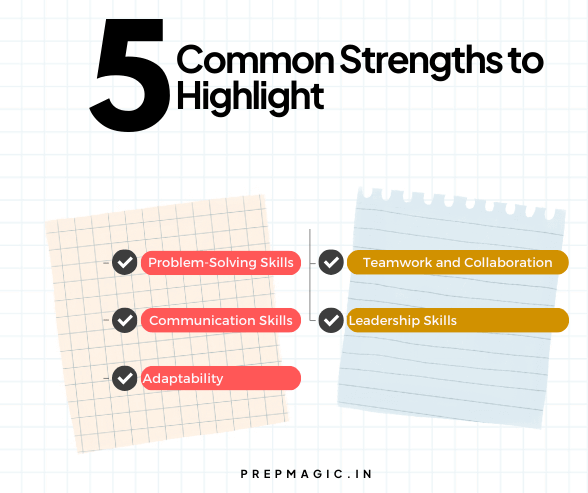Job interviews can be nerve-wracking, especially when you’re faced with questions that require self-assessment. One of the most common questions you’ll encounter is, “What is your greatest strength?” While it seems simple on the surface, your answer carries significant weight in the interview process. Employers use this question to gauge your self-awareness, confidence, and alignment with the job’s requirements.
In this blog post, we’ll guide you to effectively answer this question, ensuring that your response not only highlights your strengths but also aligns with the job you’re applying for. This guide will provide step-by-step advice, real-world examples, and key tips to help you craft a response that stands out.

Understanding the Purpose Behind the Question
Before diving into how to answer, it’s essential to understand why interviewers ask this question. Employers aren’t just looking for a list of your skills; they want to see how well you know yourself and whether you can clearly articulate your strengths in a way that’s relevant to the job.
- Self-Awareness: Interviewers want to know if you are aware of your strengths and how they contribute to your work.
- Relevance to the Job: Your answer should show that your strengths align with the job requirements.
- Confidence: The way you present your strength can reflect your confidence in your abilities.
Why Employers Ask About Your Greatest Strength
Employers ask this question to assess whether your strengths align with the job’s requirements. It’s not just about identifying a positive trait; it’s about proving that your abilities will contribute to the company’s success. When answering, you should consider:
- Relevance to the Job: Does your strength directly relate to the position you’re applying for?
- Value to the Employer: Will your strength help solve a problem or improve outcomes for the company?
- Authenticity: Are you choosing a strength that is genuinely yours and can be backed up with examples?
Choosing the Right Strength to Highlight

To answer this question effectively, you need to choose a strength that is both authentic and relevant to the job. Here are some steps to help you identify the right strength:
1. Analyze the Job Description
Start by carefully reading the job description. Identify the key skills and attributes the employer is looking for. Are they seeking someone detail-oriented, a strong communicator, or a problem-solver? By aligning your strengths with these requirements, you demonstrate that you are a perfect fit for the role.
2. Reflect on Your Past Experiences
Think about your past work experiences, both successes and challenges. Which of your strengths has consistently helped you achieve your goals? What do your colleagues and supervisors frequently praise you for? These reflections can help you pinpoint a strength that not only defines you but also has a proven track record.
3. Consider the Company’s Values
Research the company’s values and culture. If the organization places a high value on innovation, you might want to highlight a strength related to creativity or problem-solving. If they prioritize teamwork, you could focus on your ability to collaborate effectively with others.
4. Be Honest and Authentic
It’s important to choose a strength that is genuinely yours. Avoid selecting a strength just because you think it’s what the interviewer wants to hear. If you are not genuinely strong in a particular area, it will be challenging to provide convincing examples to back up your claim.
Structuring Your Answer
Once you’ve identified the strength you want to highlight, the next step is to structure your answer in a way that is clear, concise, and impactful. Here’s a simple framework to follow:
1. State Your Strength Clearly
Begin your response by clearly stating your strength. Avoid vague or overly broad terms. Instead, be specific about what makes you strong in this area.
Example: One of my greatest strengths is my ability to manage time effectively.
2. Provide Context with a Brief Example
After stating your strength, provide a brief example that illustrates how you’ve applied this strength in a professional setting. This example should be relevant to the job you’re applying for and demonstrate the positive impact your strength had on a project, team, or company.
Example: In my previous role as a project manager, I was responsible for overseeing multiple projects simultaneously. My time management skills allowed me to prioritize tasks, delegate responsibilities effectively, and ensure that all projects were completed on time and within budget.
3. Connect Your Strength to the Job
Finally, connect your strengths to the job you’re applying for. Explain how this strength will help you succeed and contribute to the company’s success. This helps the interviewer see the direct value you bring to the table.
Example: I believe that my ability to manage time efficiently will be particularly valuable in this role, where juggling multiple deadlines and priorities is essential to ensuring project success.
Common Strengths to Highlight

While your chosen strength should be personal and relevant, here are some common strengths that employers often value:
1. Problem-Solving Skills
Employers value candidates who can think critically and come up with solutions to challenges. If problem-solving is your strength, be prepared to discuss a time when you successfully resolved a complex issue.
Example: I excel at identifying the root cause of a problem and developing innovative solutions. For instance, in my last position, I was able to streamline a process that reduced our delivery times by 20%.
2. Communication Skills
Strong communication skills are essential in almost every role. Whether it’s verbal or written communication, being able to convey ideas clearly and effectively is a valuable strength.
Example: My greatest strength is my ability to communicate complex ideas in a way that is easy for everyone to understand. In my last job, this skill helped bridge the gap between the technical and marketing teams, leading to more cohesive strategies.
3. Adaptability
In today’s fast-paced work environment, being adaptable is crucial. If you can quickly adjust to new situations and handle change with ease, this could be your key strength.
Example: I thrive in dynamic environments where priorities can shift quickly. My adaptability has allowed me to maintain productivity and keep my team focused, even when faced with unexpected challenges.
4. Teamwork and Collaboration
If you are someone who works well with others and can contribute positively to a team, this is a strength worth highlighting. Employers often seek candidates who can collaborate effectively in group settings.
Example: I am highly collaborative and enjoy working in team environments. In my last role, I led a cross-functional team that successfully launched a new product, thanks to our strong teamwork and clear communication.
5. Leadership Skills
Leadership is not just about managing people; it’s about inspiring and motivating others to achieve their best. If you have leadership experience, this could be a standout strength.
Example: I have a natural ability to lead and inspire teams. In my previous job, I managed a team of 10 and was able to increase productivity by 15% by implementing new strategies and fostering a positive work environment.
Common Mistakes to Avoid
1. Being Too Humble: Some candidates downplay their strengths out of fear of sounding boastful. Remember, this is your opportunity to showcase what makes you a strong candidate. Be confident in your abilities.
2. Choosing a Weak Strength: Avoid picking a strength that is not relevant to the job or one that doesn’t set you apart from other candidates. Your goal is to make a strong impression, so choose a strength that highlights your unique value.
3. Giving a Generic Answer: Generic answers like “I’m a hard worker” or “I’m a team player” won’t make you stand out. Instead, be specific about your strengths and provide examples to back up your claims.
Practicing Your Response
The key to delivering a strong answer to the “What is your greatest strength?” question is practice. Here’s how to refine your response:
1. Write Down Your Answer
Start by writing down your answer, using the structure outlined above. This will help you organize your thoughts and ensure that you cover all the important points.
2. Practice Out Loud
Practice saying your answer out loud. This will help you get comfortable with the wording and ensure that your delivery is smooth and confident.
3. Get Feedback
If possible, practice with a friend or mentor and ask for feedback. They can provide valuable insights and help you refine your answer further.
4. Stay Flexible
While it’s important to prepare, you should also be ready to adapt your response based on the flow of the conversation. The interviewer may ask follow-up questions, so be prepared to discuss your strengths in more detail if needed.
Conclusion
Answering the question “What is your greatest strength?” is an opportunity to showcase what makes you a valuable candidate. By choosing a strength that is relevant to the job, providing a concrete example, and connecting it to the role you’re applying for, you can create a compelling response that leaves a positive impression on the interviewer. Remember to stay authentic, be specific, and practice your answer so that you can deliver it with confidence. With the right preparation, you can turn this common interview question into a powerful moment that highlights your qualifications and sets you apart from other candidates.
For those looking to excel in their interviews, Prepmagic offers the best preparation for interview questions and career guidance. With expert resources and tailored advice, Prepmagic equips you with the tools you need to confidently navigate your job search and achieve success in your career journey.
